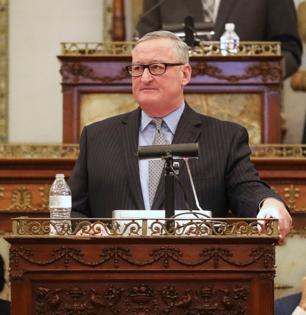Ex-Philly Mayor Jim Kenney's 2021 order replacing Columbus Day with Indigenous Peoples Day is invalid, appeals court says
Published in News & Features
PHILADELPHIA — Former Mayor Jim Kenney violated the City Charter when he signed a 2021 executive order replacing Columbus Day with Indigenous Peoples Day, a Commonwealth Court panel said Wednesday.
In a unanimous decision, the seven appeals court judges found that by eliminating a city holiday and creating a new one, Kenney engaged in “lawmaking” that is reserved to City Council.
“It therefore runs afoul of the separation of powers inherent in the Charter and, accordingly, is invalid,” Judge Patricia McCullough wrote in the opinion.
The judges pointed out that federal holidays are established by Congress, and state holidays by the Pennsylvania General Assembly.
For example, in the same executive order, Kenney recognized Juneteenth as a city holiday. The difference between that and the change to Columbus Day is that in 2019, the General Assembly recognized Juneteenth as a state holiday.
The ruling is a victory for Italian American heritage organizations that have been attempting to reverse the executive order since April 2021, three months after it was signed by Kenney.
The Conference of Presidents of Major Italian Organizations, Councilmember Mark Squilla, and other organizations first filed a lawsuit in federal court accusing Kenney’s administration of a pattern of discrimination against Italian American constituents. But a federal judge dismissed the lawsuit, finding that they failed to show discriminatory treatment or intent.
They then filed a similar lawsuit in the Philadelphia Court of Common Pleas in April 2022. The city asked the court to toss the complaint; Common Pleas Judge Daniel Anders dismissed the lawsuit.
The Commonwealth Court panel disagreed with Anders’ analysis and nullified the order. Because the matter surrounds “a question of law and no disputed facts” further litigation is “unnecessary,” the opinion said. It instructs the lower court to enter a judgment in the case consistent with the Commonwealth Court’s ruling.
George Bochetto, an attorney with Bochetto & Lentz who filed the lawsuit, called the decision a “proper spanking” of the Kenney administration.
“It is just as clear as a bell, this executive order was illegal,” Bochetto said.
The city can appeal the ruling but the Pennsylvania Supreme Court is not required to take up the case.
A spokesperson for the Philadelphia Law Department said that the city is reviewing the opinion and declined to comment further.
Following the murder of George Floyd by Minneapolis police officers, and the Black Lives Matter protests that followed, the Kenney administration took steps to remove city monuments that some deemed offensive. These included the removal of the statue of former Mayor and Police Commissioner Frank L. Rizzo outside the Municipal Services Building.
The administration also placed a box over the statue of Christopher Columbus at Marconi Plaza on Broad and Oregon Streets as protests ensued. (In December 2022, the Commonwealth Court ordered Philadelphia to remove the box.)
The change of Columbus Day to Indigenous Peoples Day followed similar actions by cities and some states across the country. The move aims to rebuke Columbus’ racist views and his 1492 expedition’s role in commencing a genocide of Native Americans.
Speaking about the statue controversy in 2022, Mabel Negrete, executive director of Indigenous Peoples’Day Philly Inc., said that people who celebrate Columbus are unaware of the harm he caused native people.
“Unfortunately, the Italian Americans that are pro-Columbus do not see the role they play, from the 1800s to this day, in the propaganda to remove Native Americans within the United States,” Negrete said.
But some Italian American organizations viewed the targeting of Columbus as an assault of their heritage.
Squilla said that his main objection to the holiday change was procedural. A mayor shouldn’t be able to change a holiday unilaterally without input from Council, the Councilmember said.
“Hopefully, if anybody wanted to make changes in the future, it will include Council and the public in a way that would be fair to everyone,” Squilla said.
But he also didn’t like that the order on the holiday “removed it from one and gave it to another.” Philadelphia should have a day to celebrate Indigenous people, Squilla said, but it shouldn’t come at the expense of another group’s day of celebration, even if some people don’t like the name.
The holiday in dispute is celebrated on the second Monday in October, which falls on Oct. 13 this year. Regardless of the prospect of an appeal, City Council could codify the change from Columbus Day to Indigenous Peoples Day. The legislative body will meet next on Sept. 11.
Council President Kenyatta Johnson declined to comment.
Squilla doesn’t think Council has the appetite to codify the change of the holiday through legislation, and he hopes the ruling “will put the issue to rest moving forward.”
Bochetto meanwhile is excited to celebrate Columbus Day, saying that the entire Italian American community is going to rejoice following the decision.
“It may be the best and most celebrated Columbus Day in a long time,” the attorney said.
©2025 The Philadelphia Inquirer, LLC. Visit at inquirer.com. Distributed by Tribune Content Agency, LLC.







Comments